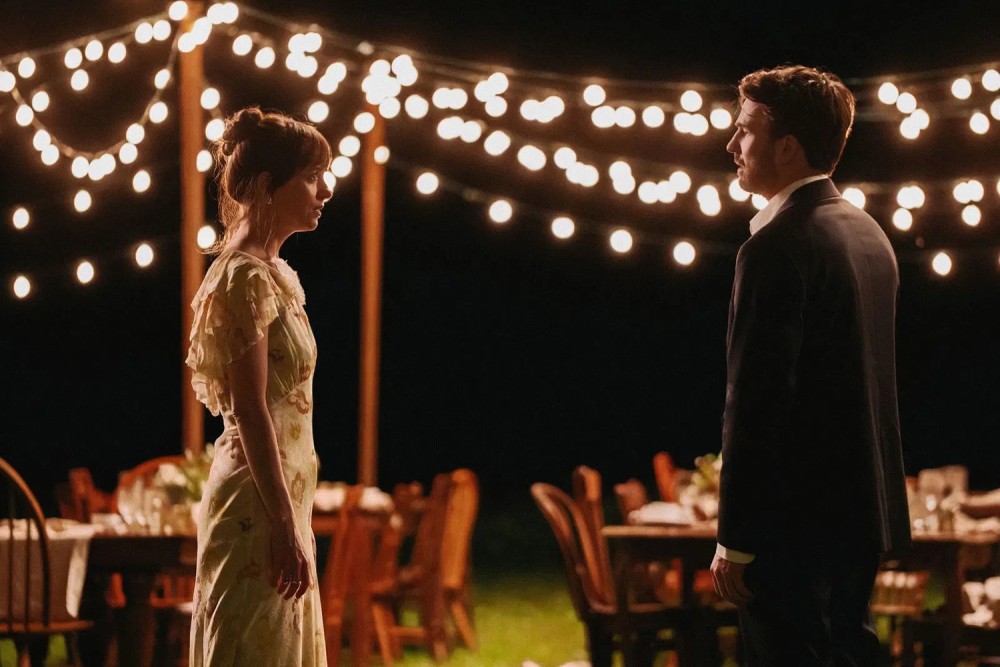Modern love
At first, Materialists seems like a brutal reckoning with our metric-obsessed age. But director Celine Song has bigger themes in mind.

Dakota Johnson and Chris Evans in Materialists. (Photo courtesy of A24)
If you have not been dating lately, the new romantic comedy Materialists (directed by Celine Song) will likely make you exceedingly grateful for that fact. Lucy (Dakota Johnson) is a matchmaker whose clients come with a long list of demands for their perfect partner—height, weight, income, hobbies, even hair and eye color. They are all well-paid professionals who are too busy—or too burned—to stick it out in the toxic wasteland of internet dating. Lucy promises true love: not just a few good dates but “a nursing home partner and a grave buddy.”
But to get there, everyone is reduced to a set of statistics and probability. Balding men under six feet tall will need to make up those deficits with higher paychecks; women over the age of 35 will need to compromise on that no balding requirement.
Lucy has embraced this marriage-as-business-proposition view, and she has her own specifications. Or really just one: exceptional wealth. When she meets Harry (Pedro Pascal), the brother of the groom at the wedding of one of her successful matches, she seems to have found her unicorn—an extremely wealthy man, six feet tall, solid head of hair, who is both charming and kind, with no discernible bad habits or dangerous secrets.
At the same wedding, though, she also reconnects with her ex-love John (Chris Evans), who is working as a cater-waiter and still trying to get his stage acting career off the ground. Despite his Captain American good looks, John has little to offer Lucy besides uncouth roommates and cheap beer in badly lit dive bars. But once upon a time, they were soulmates. Hence begins the gentle push and pull as Lucy must decide between her head and her heart.
It would be a mistake, however, to reduce this to a choice between love and money. Lucy is clear that she doesn’t want to be a poor man’s wife, but she also isn’t willing to settle for a marriage that is based only on material calculation. Love is an essential ingredient to a long-lasting marriage and something she won’t settle without. Her job is to screen for “pre-existing conditions”—for herself and her clients—that might predict if a couple can find long-term compatibility. Then the couple must figure out if love can grow in those conditions. Once they get past all the superficial ideas about height and eye color, the conditions that matter most in Lucy’s business are more sociological and psychological: educational level, similar family structures of origin, similar expectations about child-rearing and budgeting, arguing style. The spark of love is essential to fire the engines of marriage, but it will only travel the long distance of life if it can run down tracks paved by similar experiences and expectations. To say “we were made for each other” is to name that magical alchemy when social compatibility and love collide.
At first blush, this seems like a brutal reckoning with our metric-obsessed age, where everything can be reduced to a quantifiable (and monetized) value. But Song is thinking about bigger themes of fate and love. Her first feature-length film, Past Lives (2023), follows the story of Nora (Greta Lee) and Hae Sung (Teo Yoo), childhood best friends in Korea who are separated when Nora’s family emigrates to Canada. They reconnect on the internet as young adults and sense the possibility of love. But the practical obstacles are too great—long distance, commitment to their own careers—and soon they are partnered with different people. When Hae Sung finally comes to visit Nora in the United States, where she lives with her White, Jewish husband, the weight of all their could-have-beens hangs heavy over them.
I often assign Past Lives to my students as an example of a movie shaped by a Buddhist sensibility, much like we might say any number of American movies that feature redemptive suffering are shaped by a Christian sensibility even if they are not explicitly religious. None of the characters are devoted Buddhists, but the characters talk about the Korean Buddhist idea of in-yun, which explains how people’s lives are entangled across many different lifetimes. When two people marry, it is said there are 8,000 layers of in-yun from past lives that have woven their paths together such that they are ready for this commitment. And if two people do not marry, it likewise might mean that they do not yet have the layers of connection needed. “What if this is a past life as well,” Hae Sung says, “and we are already something else to each other in our next life.”
This concept provides solace for Nora and Hae Sung, a way to make sense of the sadness that comes from the far-too-common story of immigration, cultural conflict, and the slow accretion of choices that lead to lives that grow farther apart. Materialists doesn’t have the larger Buddhist concept to draw on, and it doesn’t hold together as well as a film, but it has a kind of Western sociological fatalism that is not altogether different. Different viewers might have different judgments of Lucy’s final decision—did she choose wisely? Do we believe her motives? But in the end, she is following her own prescriptions, seeking to wed the spark of love with the longevity of sociological predictions. In a sea of endless choice, any principle of choosing is a lifeline.
Both of Song’s movies have drawn critical praise—Past Lives was nominated for several Academy Awards—and both are wildly popular among Gen-Z audiences. She offers a way to understand life as bounded by forces we cannot simply escape through agency and romantic willpower. It might not amount to much more than old adages like “bloom where you’re planted” and “make the most of what life gives you.” But for a generation that is growing weary of the unrelenting imperative to “maximize their lives” and the false promise that a perfect life can be engineered by the right set of choices, it is hitting a nerve and suggesting that we need new—or maybe old—stories about love and commitment.





